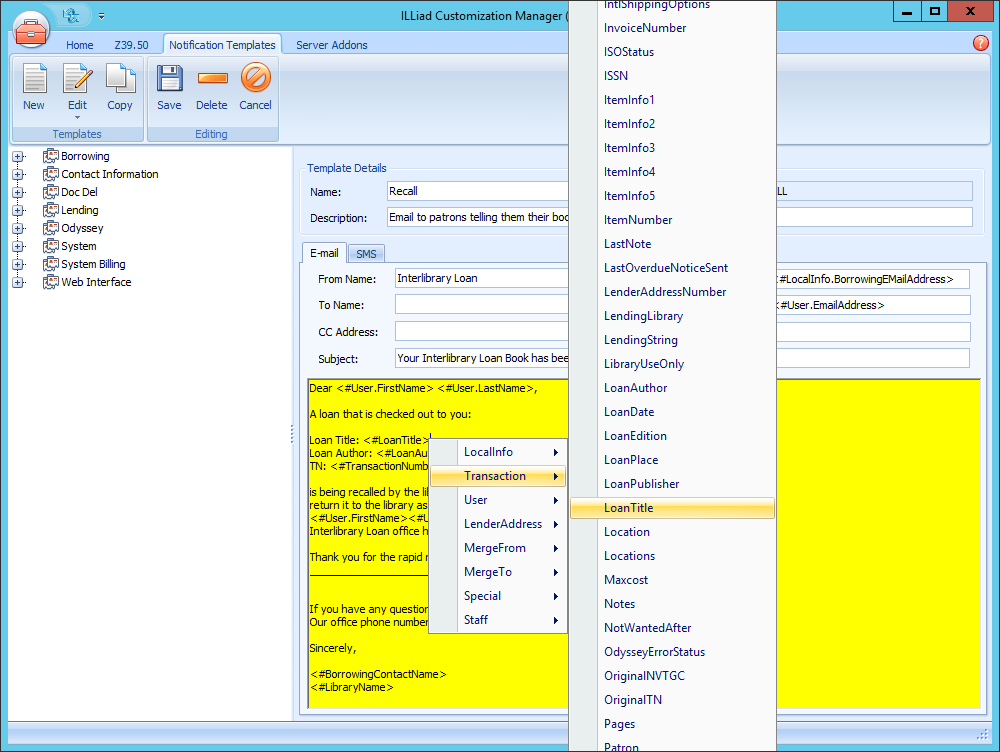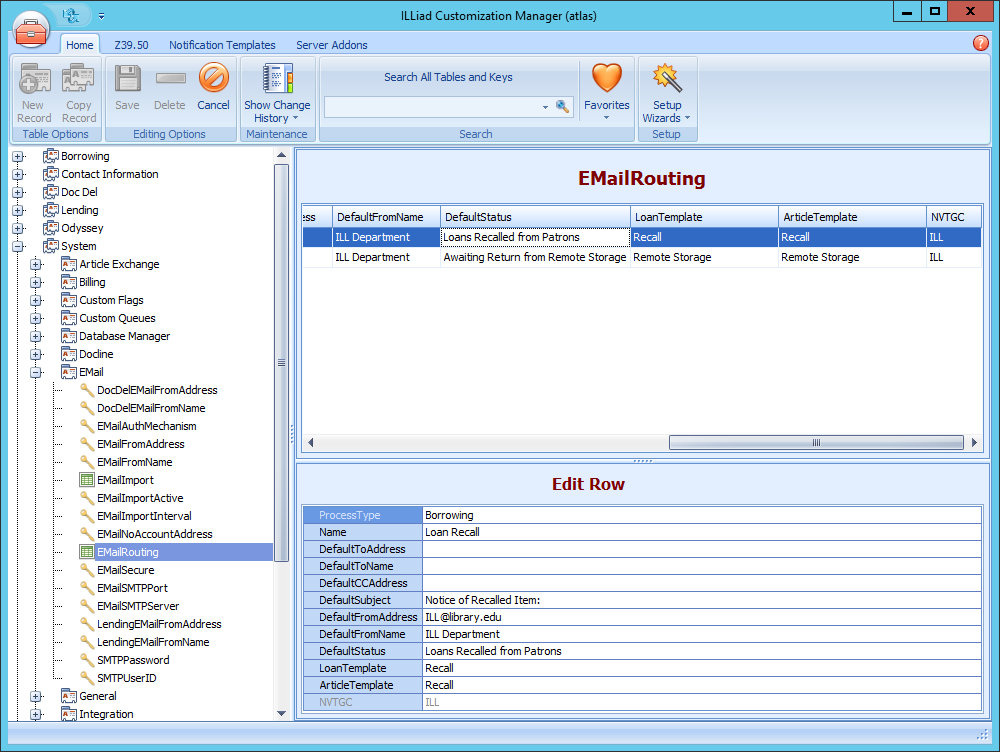Email Routing
Answer
Email Routing
What is it?
Email routing uses a combination of custom email templates in combination with transaction status changes to allow libraries to create their own customized processing actions.
How does it help?
Some ILL staff learn they can process unusual transactions that don’t fit into the standard ILLiad workflow by manually changing statuses and sending email outside of the ILLiad client. But, these workarounds require extra time, tedious mouse clicking, cutting & pasting, etc. Email routing can help you reduce some of these workarounds through a custom procedure requiring only a few mouse clicks.
Getting started
Create your email template
ILLiad email templates are stored in the ILLiad database and can be created and edited in the ILLiad Customization Manager under the Notification Templates tab. To create a new email template:
- In the ILLiad Customization Manager, click the Notification Templates tab.
- Click New.
- Complete the template fields.
- When you have completed the form, click Save.
- You will now be able to view your template from the Edit dropdown.
By default, ILLiad uses specific templates for certain processes. A complete list of such templates can be found in the ILLiad documentation.
To pull in information specific to the request, you can use tags. These need to be formatted as <#TableName.FieldName>. You can easily add these tags by right-clicking anywhere on the template to see a drop-down menu with all available fields.

Use your template in an email routing
Logon to the ILLiad Customization Manager. Select System, then Email, and then click on the EmailRouting table.

Click on the New Record button to create a new rule, or select an existing rule that you want to start from and click on the Copy Record button. Key elements are:
-
DefaultToName/Address: This is the recipient of your email. Leave this blank and ILLiad will automatically supply the user’s info (in borrowing & doc del) or library’s info (in lending).
-
DefaultFromName/Address: This is the return email address and name for your borrowing/lending/doc del contact person.
-
DefaultSubject: This is the email subject and can contain the same field tags used in email templates.
-
DefaultStatus: This is the status/queue to which ILLiad will move the transaction when the routing is executed. Leave this blank if you don’t want to change the status.
-
FileNameLoan/Article: The file name of your custom email template (remember the “.txt” extension).
Once you are finished creating or editing your email routing, save your changes. You will now be able to access them from the Send Email menu during request processing.
Examples
ALA ILL request:
This email routing can automate the process of sending ALA forms to libraries that are not OCLC lenders. Before sending the email, be sure to change the System ID to “OTH” and select your lender.
|
ProcessType |
Borrowing |
|
Name |
ALA Request |
|
DefaultToAddress |
library@library.com |
|
DefaultToName |
Interlibrary Loan Office |
|
DefaultCCAddress |
|
|
DefaultSubject |
ALA Interlibrary Loan Request |
|
DefaultFromAddress |
(Your department contact’s email) |
|
DefaultFromName |
(Your department contact’s name) |
|
DefaultStatus |
Request Sent |
|
FileNameLoan |
ALAemail.txt |
|
FileNameArticle |
ALAemail.txt |
Ask patron a question
This is useful if you want to email a user about a request or citation without having to hand type information about the requested item. This email routing does not change the status of the request.
This email can be used in both Borrowing and Document Delivery -- just copy it and change the ProcessType to “Doc Del.”
|
ProcessType |
Borrowing |
|
Name |
Ask patron a question |
|
DefaultToAddress |
|
|
DefaultToName |
|
|
DefaultCCAddress |
|
|
DefaultSubject |
Question regarding your ILL request for “<#LoanTitle><#PhotoArticleTitle>” |
|
DefaultFromAddress |
(Your department contact’s email) |
|
DefaultFromName |
(Your department contact’s name) |
|
DefaultStatus |
Request Sent |
|
FileNameLoan |
AskPatron.txt |
|
FileNameArticle |
AskPatron.txt |
Bill patron for lost item
Use this to send an email to the patron, circulation staff, and/or the bursar to bill the patron for a lost book. You can also use this if you are going to block the user, as well.
|
ProcessType |
Borrowing |
|
Name |
Bill Patron for Lost/Damaged Item |
|
DefaultToAddress |
|
|
DefaultToName |
|
|
DefaultCCAddress |
|
|
DefaultSubject |
Interlibrary Loan Replacement Charges for: <#LoanTitle> |
|
DefaultFromAddress |
(Your department contact’s email) |
|
DefaultFromName |
(Your department contact’s name) |
|
DefaultStatus |
Checked Out to Customer (or you can use a custom queue such as “Billed for Replacement”) |
|
FileNameLoan |
BillLost.txt |
|
FileNameArticle |
BillLost.txt |
Cancelled after updating to ‘Shipped’
Sometimes you accidentally update a lending request to ‘Shipped,’ only to discover that you can’t send the item after all. Use this email routing to contact the borrowing library so they can request this again from other libraries.
|
ProcessType |
Lending |
|
Name |
Cancelled after updating to shipped |
|
DefaultToAddress |
|
|
DefaultToName |
|
|
DefaultCCAddress |
|
|
DefaultSubject |
Cannot supply OCLC ILL #<#ILLNumber> |
|
DefaultFromAddress |
(Your department contact’s email) |
|
DefaultFromName |
(Your department contact’s name)</ |
